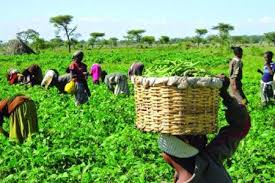Flood: Stakeholders urge govt’s intervention to avert zero harvests in Adamawa
Story from Dipo SANUSI
Stakeholders have called on the federal and Adamawa state government to urgently come to the aid of farmers in the state to support recovery and prevent further devastating impacts of the flooding being experienced, even as the threat of zero harvests is obvious in the state and other parts of northern Nigeria.
This alarm was raised recently at a one-day mid-season interactive workshop for agriculture stakeholders at Madugu Rockview Hotel Yola, Adamawa state capital.
READ ALSO: Yobe prepares as NIMET, NIHSA warn of flash floods in 33 states
The workshop was organised by HEDA Resource Centre in partnership with Nigeria Meteorological Agency (NiMET).
“Unless the federal government and the Adamawa state government make an urgent and drastic intervention, Adamawa farmers like many other farmers in northern Nigeria are going to experience zero harvests this year as flooding has taken over many farmlands, destroyed houses and properties of farmers and have even led to the loss of lives in the state”, participants observed in a communiqué issued at the end of the workshop.
The workshop engaged in a mid-season assessment of the awareness, adoption and utilisation of climate data produced by NiMET through the annual Seasonal Climate Predictions (SCP) and other more frequent forecasts, for planning, production, processing, marketing and consumption of the agricultural produce.
According to the communiqué, “climate change impact continues to be a major threat and stressor to food security, livelihoods and poverty reduction in Adamawa state which may reverse gains made towards achieving the Sustainable Development Goals and other national and state development agendas.
It added that: “This is also compounded by insecurity which prevents many farmers from engaging in dry season planting”.
Participants, however, observed the lack of awareness about climate information services from NiMET, lamenting that “despite the prediction of heavy rainfall and other climatic predictions released by NiMET, most farmers in the state are not aware of the information and as a consequence not being able to forestall the adverse effect of these extreme weather on their agricultural activities”.
In addition, participants decried the inadequacy of extension officers to support farmers and disseminate climate information.
“Adamawa State Agriculture Development Programme currently has just 80 extension officers. This is grossly inadequate to support the farmers not to talk of dissemination of climate information and knowledge about climate-smart agriculture”.
Participants called on Adamawa State Government to urgently recruit, train and empower more extension workers to support the dissemination of information, knowledge and market access to farmers across the state.
The workshop noted that the overflowing of River Benue coupled with high intense rain heavily devastated farmers, farmlands and livelihood, adding: “those who live along the Benue River are suffering from flooding as a result of the predicted high rain intensity that they experience and management of Lagdo dam.”
The workshop, therefore, called on the government to do an emergency intervention because the flooding occurred at a time farmers were preparing for the 2022 harvest with grievous implications for the cost of food, going into the festive period and more so the new year.
“It’s very important that the government take immediate action by helping farmers to survive and quickly recover from this disaster. More importantly to immediately embark on the dry season farming as soon as the rain stops and the flooding recedes,” the communique said, stressing the urgency of the dry season farming and the government’s support to farmers to embark on this.
Participants called for a national dialogue on the impact and management of big dams and major water bodies on agriculture in Nigeria to reduce preventable losses and deaths.
The workshop recommended that governments and private sector companies should promote climate insurance and other innovative support systems to enable farmers to recover after a climate shock.
“Climate change further widens the inequality gap between men and women along social class, as well as deepening poverty, especially for young and elderly people. To this end, the governments and private sector companies should promote climate insurance and other innovative support systems to enable farmers to recover after a climate shock.”
Participants also urged Adamawa State Government to work vigorously with NiMET and other agriculture research institutions as well as the mass media to develop an early warning system. This will effectively communicate climate information to farmers and equip them with the knowledge and capacity to act on the information.
In the same vein, the workshop emphasised the need for all the local governments in Nigeria to work out a plan with NiMET towards increasing weather stations in their various communities, adding that this will also increase weather points across the country.
“This will improve the accuracy of the data that NiMET will generate and their early warning system”, the workshop noted while urging the local governments, in collaboration with NiMET, to also work on a flood alert mechanism.
Stakeholders in attendance include; Directors and Deputy Director in the State’s Ministry of Agriculture, Extension Officers, the General Manager AgroMet Services from NiMET, Academics, Non-Governmental Organisations, Farmers’ groups and the media.
Presentations were made by resource persons including NiMET which gave an update on the efforts of the agency to increase efforts to deliver climate data regularly and on time to every sector of the Nigerian economy.
Follow the Neptune Prime channel on WhatsApp:
Do you have breaking news, interview request, opinion, suggestion, or want your event covered? Email us at neptuneprime2233@gmail.com





